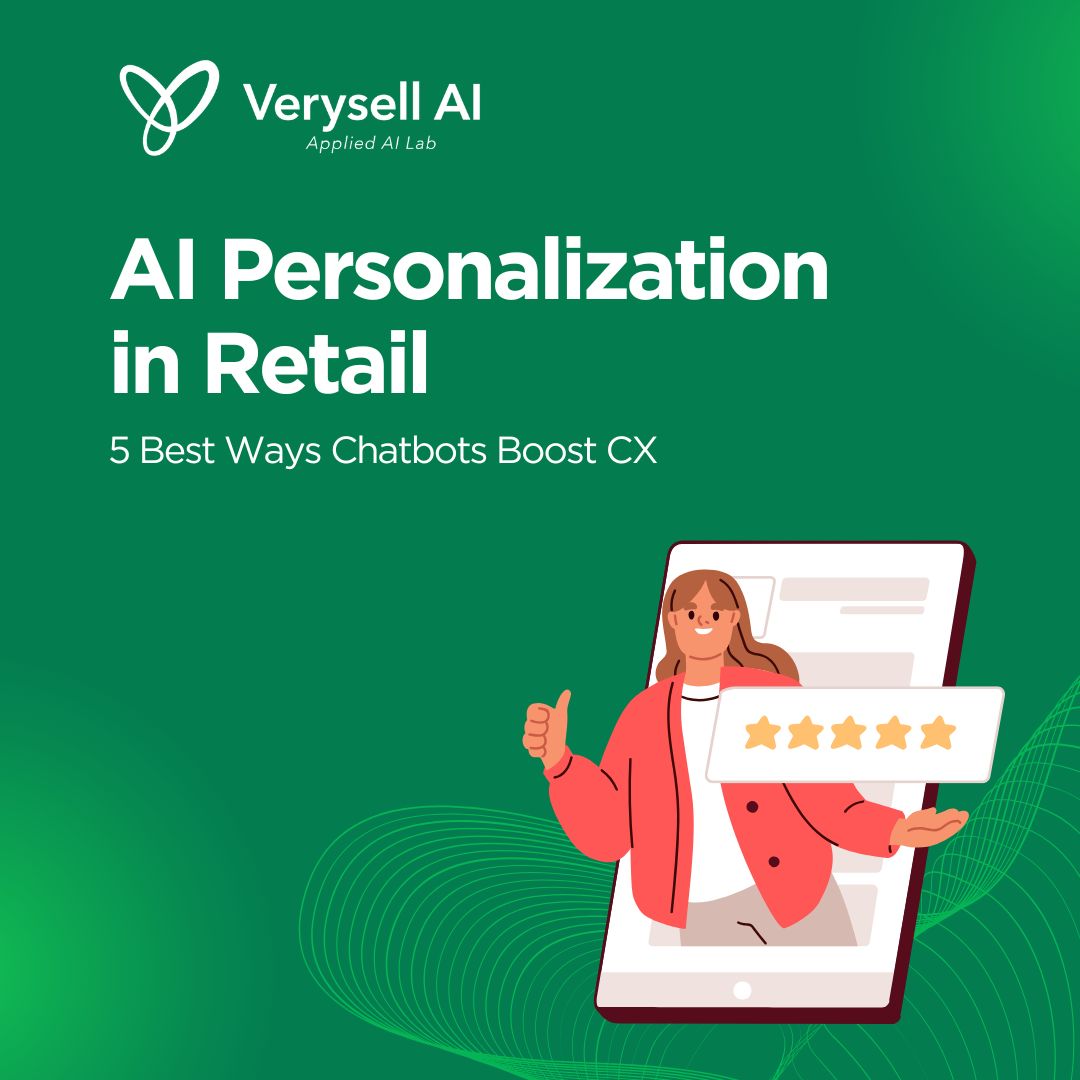AI personalization in retail is transforming customer experience (CX) by enabling businesses to deliver tailored interactions that resonate with individual preferences. Through the use of AI-driven chatbots, retailers can enhance engagement by providing real-time, personalized assistance, recommendations, and support. This innovative approach not only improves customer satisfaction but also drives sales and builds long-term loyalty. In this blog post, we will explore the five best ways chatbots are enhancing customer experience (CX) in retail and how AI personalization is transforming the future of shopping.
>> Read more: 5 Powerful Ways AI Chatbots in Retail Reduce Business Costs

1. AI Personalization in Retail Product Recommendations
One of the most significant advantages of AI chatbots is their ability to offer personalized product recommendations. Through analyzing a customer’s browsing history, purchase behavior, and preferences, AI chatbots can suggest items tailored specifically to each individual. This level of personalization was once reserved for in-person interactions, where a salesperson could assess a customer’s needs based on their behavior. Now, chatbots bring this experience to online platforms, ensuring every interaction is highly relevant.

Chatbots track data such as previous purchases, search queries, and demographic information to enhance the shopping experience. By analyzing this data, they can recommend products that align with a customer’s preferences. Additionally, chatbots can suggest complementary items, such as accessories that pair well with a customer’s chosen product, further personalizing the shopping journey and driving sales. This approach not only makes the shopping experience more enjoyable but also drives higher conversion rates. Personalized recommendations increase the likelihood of a customer making a purchase, as they feel the products are directly relevant to them (Omale, 2019).
2. Real-Time Customer Support
Customer support has always been an essential part of the retail experience. However, the traditional model often requires long waiting times, leading to frustration and dissatisfaction. Chatbots, on the other hand, provide instant assistance, reducing wait times and improving overall customer satisfaction.

AI chatbots utilize natural language processing (NLP) to understand and respond to customer queries in real-time. They effectively address common issues such as tracking orders, answering product questions, and assisting with returns or exchanges. For more complex problems, chatbots can escalate the conversation to a human representative, ensuring a smooth transition and maintaining a high level of customer service. By offering instant responses, chatbots enhance CX by making it easy for customers to find the help they need without delays. This reduces the burden on human agents and allows them to focus on more complex cases, ultimately improving efficiency and customer satisfaction (Rafalski, 2025).
3. 24/7 Availability
Unlike traditional customer service models, AI-powered chatbots don’t have set working hours. They are available 24/7, ensuring that customers can interact with brands whenever they need to, regardless of time zone differences. This round-the-clock accessibility is especially crucial for global retailers or businesses that cater to diverse markets.

Chatbots are available 24/7 to answer inquiries, assist with shopping, and provide product information. With AI learning capabilities, they continuously improve their responses and performance over time, adapting to customer needs even during off-hours. This ensures that customers receive timely and relevant assistance whenever they need it. This ability to provide continuous customer service ensures that customers can shop, inquire, or get help at any time, leading to higher customer loyalty and satisfaction. Additionally, this reduces the reliance on human agents for after-hours support, making it a cost-effective solution for retailers (NICE, 2025).
4. Enhanced Shopping Experience with Conversational Commerce
Conversational commerce refers to the use of messaging apps, voice assistants, or AI-driven chatbots to facilitate shopping. This form of e-commerce blends communication with retail transactions, allowing customers to shop directly through a conversation with a chatbot. Chatbots can guide customers through their shopping journey by suggesting items, adding products to the cart, and even processing payments directly within the chat interface.

For example, if a customer inquires about a specific jacket, the chatbot can provide options, availability, size details, and even a direct link to purchase. By leveraging rich media such as images, videos, and product catalogs, chatbots engage users more effectively, creating a conversational experience that closely mimics interaction with a human. Conversational commerce is transforming how retailers approach sales, blending customer service with shopping in a way that is both engaging and efficient. It enables customers to complete purchases seamlessly without having to navigate multiple pages or deal with distractions.
5. Customer Insights and Feedback Collection
Chatbots are not only great for enhancing customer experiences but also for gathering valuable insights that can help improve services and products. By interacting with customers in real-time, chatbots can collect feedback about products, services, or the shopping experience itself. This helps retailers understand customer needs, preferences, and pain points more accurately.

Chatbots can engage customers in surveys or casual conversations about their shopping experience. They may ask questions like, “How was your experience with our service today?” or “Would you recommend our product?” By collecting this data automatically, retailers can quickly analyze trends, identify issues, and implement data-driven improvements, enhancing overall customer satisfaction and service quality. Customer insights gathered through chatbots provide a continuous feedback loop, allowing businesses to make adjustments and improvements in real-time. This helps retailers stay ahead of the competition by aligning their offerings with customer expectations and preferences.
Conclusion: The Future of Retail CX with AI Chatbots
The integration of AI-powered chatbots into the retail industry is changing the way brands engage with customers. Through personalized product recommendations, real-time support, 24/7 availability, conversational commerce, and valuable customer insights, chatbots are helping businesses enhance their customer experience in ways that were once unimaginable.
Retailers that leverage AI personalization can expect not only increased customer satisfaction but also higher conversion rates and better customer retention. With the ability to deliver relevant and timely interactions, chatbots are an essential tool for any modern retailer looking to stay competitive in today’s fast-paced market.
As AI technology continues to advance, we can expect chatbots to become even more sophisticated, offering hyper-personalized experiences that cater to individual preferences. The future of retail lies in creating seamless, efficient, and engaging customer experiences, and chatbots are leading the charge.


